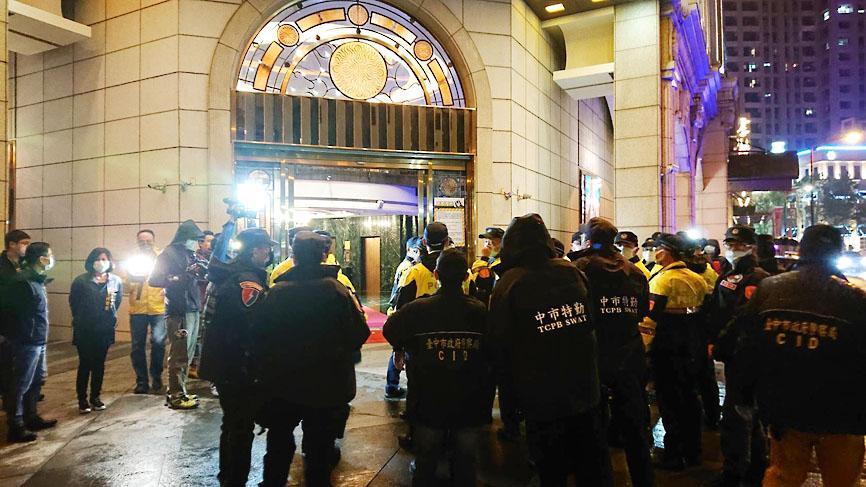The Taichung City Government is asking all hostess bars and dance halls to suspend operations as part of an administrative order from the Central Epidemic Command Center (CECC), the city said yesterday.
The CECC on Wednesday issued the order after a hostess in Taipei tested positive for SARS-CoV-2, the virus that causes COVID-19.
Individuals or establishments that breach the order face fines of NT$3,000 to NT$15,000, in accordance with the Communicable Disease Control Act (傳染病防治法), the municipality said.

Photo courtesy of the Taichung City Government
Taichung Mayor Lu Shiow-yen (盧秀燕) said that similar businesses — KTVs, saunas, bars, nightclubs, “special service” cafes and arcades — are to continue to follow prevention guidelines, such as wearing masks, taking temperatures and observing social distancing.
The government is also enforcing new regulations for these establishments to record the names and telephone numbers of clients upon entry.
Lu said that the new regulations are being put in place not just because of the hostess case in Taipei, but also because of similar cases in the past.
The high client turnover at these businesses makes it difficult to track individual customers, adding to the difficulty of disease prevention and increasing the risk of local cluster infections, Lu said.
The city recognizes the concerns from the management of these businesses, but it asks them for their understanding and compliance in these trying times, Lu said.
Businesses must take special measures to maintain public health during the COVID-19 pandemic, Lu added.
Meanwhile, hostess bars on Wednesday closed early for establishment-wide disinfection after the Taipei Department of Health visited regarding the employee.
Hostesses typically come from third-party companies and do not have standing contracts with the hostess bars themselves, a source said, adding that the hostess who tested positive had been dispatched to other bars.

CHANGING LANDSCAPE: Many of the part-time programs for educators were no longer needed, as many teachers obtain a graduate degree before joining the workforce, experts said Taiwanese universities this year canceled 86 programs, Ministry of Education data showed, with educators attributing the closures to the nation’s low birthrate as well as shifting trends. Fifty-three of the shuttered programs were part-time postgraduate degree programs, about 62 percent of the total, the most in the past five years, the data showed. National Taiwan Normal University (NTNU) discontinued the most part-time master’s programs, at 16: chemistry, life science, earth science, physics, fine arts, music, special education, health promotion and health education, educational psychology and counseling, education, design, Chinese as a second language, library and information sciences, mechatronics engineering, history, physical education

The Chinese military has boosted its capability to fight at a high tempo using the element of surprise and new technology, the Ministry of National Defense said in the Quadrennial Defense Review (QDR) published on Monday last week. The ministry highlighted Chinese People’s Liberation Army (PLA) developments showing significant changes in Beijing’s strategy for war on Taiwan. The PLA has made significant headway in building capabilities for all-weather, multi-domain intelligence, surveillance, operational control and a joint air-sea blockade against Taiwan’s lines of communication, it said. The PLA has also improved its capabilities in direct amphibious assault operations aimed at seizing strategically important beaches,

‘MALIGN PURPOSE’: Governments around the world conduct espionage operations, but China’s is different, as its ultimate goal is annexation, a think tank head said Taiwan is facing a growing existential threat from its own people spying for China, experts said, as the government seeks to toughen measures to stop Beijing’s infiltration efforts and deter Taiwanese turncoats. While Beijing and Taipei have been spying on each other for years, experts said that espionage posed a bigger threat to Taiwan due to the risk of a Chinese attack. Taiwan’s intelligence agency said China used “diverse channels and tactics” to infiltrate the nation’s military, government agencies and pro-China organizations. The main targets were retired and active members of the military, persuaded by money, blackmail or pro-China ideology to steal

The High Prosecutors’ Office yesterday withdrew an appeal against the acquittal of a former bank manager 22 years after his death, marking Taiwan’s first instance of prosecutors rendering posthumous justice to a wrongfully convicted defendant. Chu Ching-en (諸慶恩) — formerly a manager at the Taipei branch of BNP Paribas — was in 1999 accused by Weng Mao-chung (翁茂鍾), then-president of Chia Her Industrial Co, of forging a request for a fixed deposit of US$10 million by I-Hwa Industrial Co, a subsidiary of Chia Her, which was used as collateral. Chu was ruled not guilty in the first trial, but was found guilty